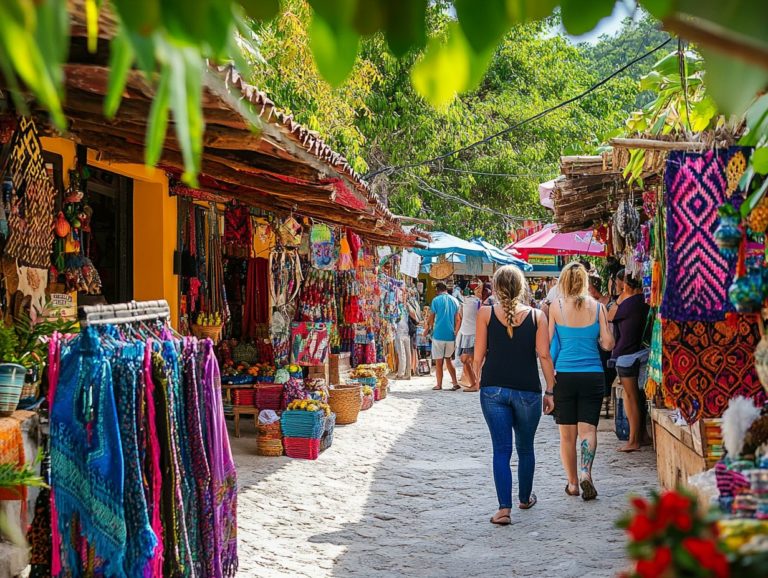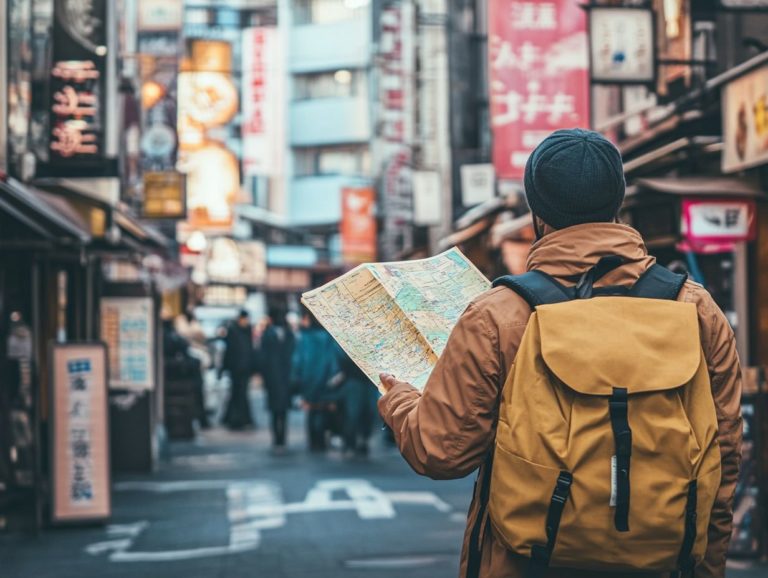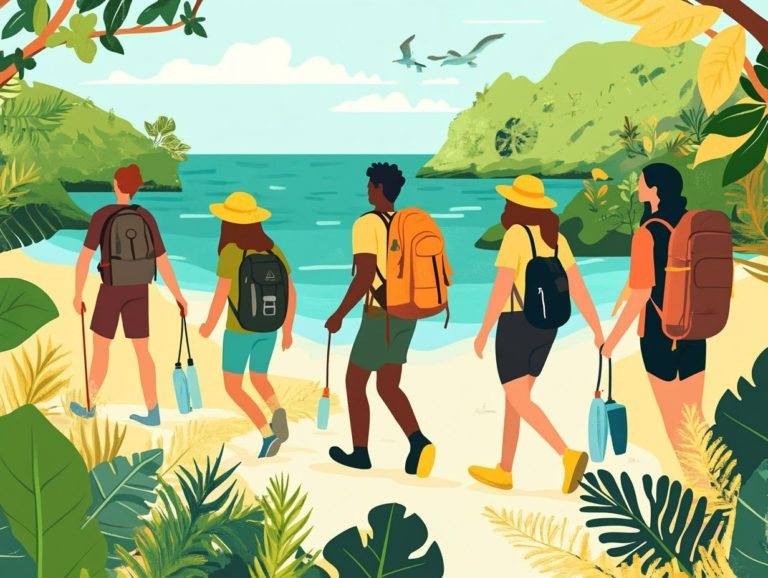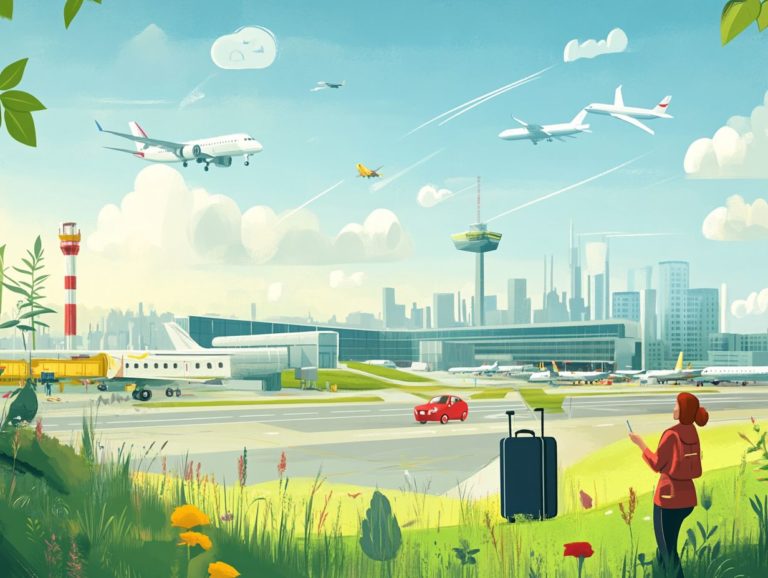Understanding the Global Impact of Travel
Travel is not merely a getaway; it profoundly shapes your world. It enriches your life and influences societal dynamics, offering benefits that are truly expansive.
However, it’s essential to consider the other side. This exploration delves into the environmental repercussions of travel, examining its impact on climate change and natural resources.
You will also discover the social aspects, highlighting the beauty of cultural exchanges alongside the challenges posed by sustainable tourism. We will also look at the economic ramifications of travel, weighing its contributions against the pressing issues of overtourism.
Embark on this journey with us as we reveal the global impact of travel and its implications for your future.
Contents
Key Takeaways:
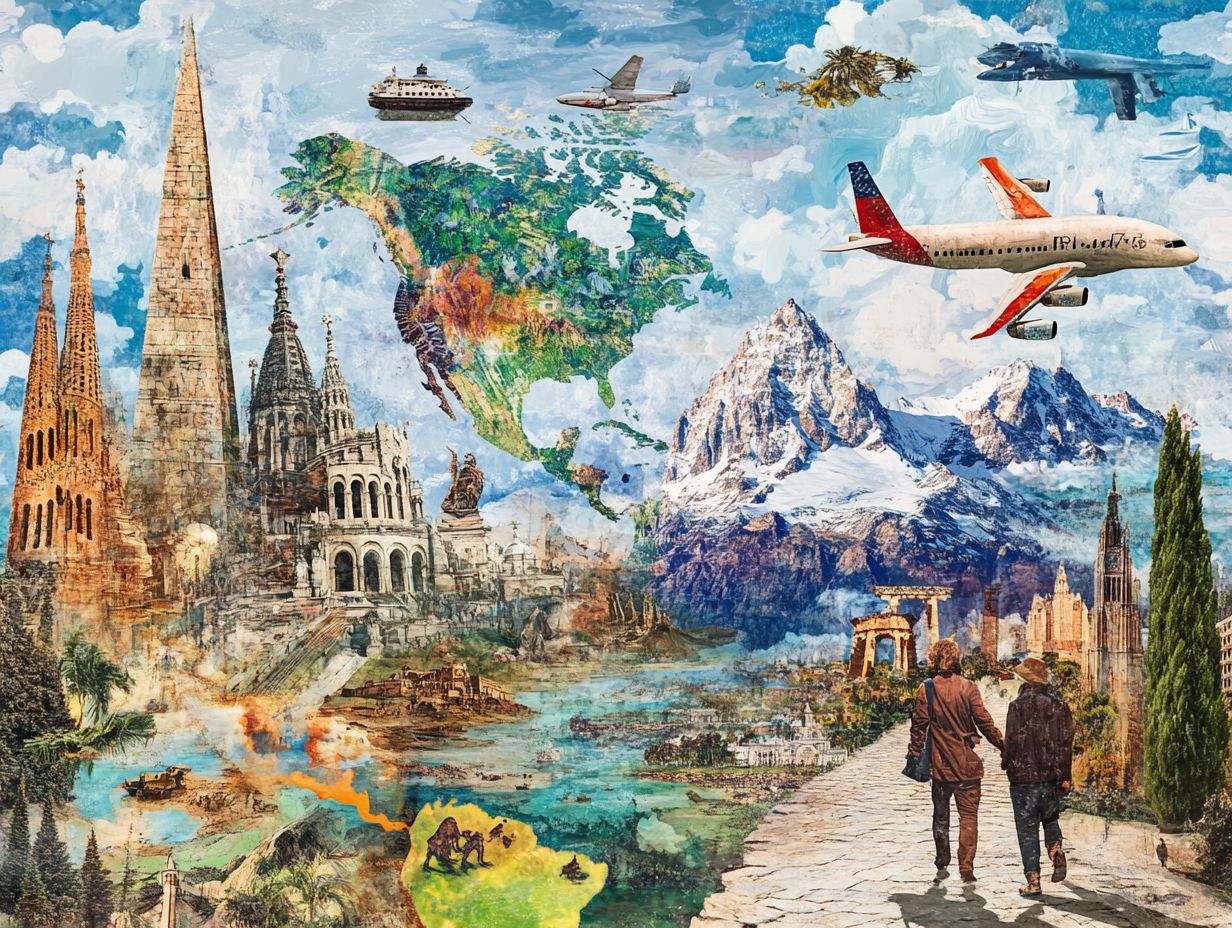
- Discover how travel brings numerous benefits to individuals and societies, including personal growth, cultural understanding, and economic boosts.
- Learn about the significant environmental impacts of travel, which contribute to climate change and depletion of natural resources.
- Understand that sustainable and responsible travel practices are crucial in addressing the social and economic challenges of overtourism and economic disparities.
The Importance of Travel
Travel is a powerful engine driving economic growth, elevating the tourism industry and generating jobs within the sector. This collective effort bolsters the global economy.
When travelers engage with local businesses, they stimulate job creation and support sustainable development initiatives. As travel trends shift, understanding the ripple effect of your travels becomes increasingly important, particularly in developing countries like South Africa, Egypt, and India.
Moreover, online travel agencies are at the forefront of driving innovation and investment opportunities in this dynamic sector, underscoring the intricate connection between travel and economic prosperity.
Benefits of Travel for Individuals and Societies
Travel presents a wealth of benefits for you and society at large. It enriches your life with diverse cultural experiences while fostering a sense of community support.
When you venture out into the world, you broaden your horizons and forge meaningful connections with people from various backgrounds. This immersion in different cultures enhances your empathy and understanding, allowing you to appreciate the rich nuances of life in foreign lands.
By participating in local tourism activities, you contribute directly to the economies of these communities. You support artisan crafts, local markets, and small businesses, bolstering local economies.
Such interactions elevate your travel experience and leave a lasting impact on the social fabric of both you and your hosts, building bridges that transcend geographical boundaries.
Environmental Impact of Travel
The environmental impact of travel is a pressing concern, especially as the tourism industry expands and contributes to climate change and the depletion of natural resources. Embracing sustainable tourism practices is essential for mitigating these effects, ensuring that travel remains a viable option for future generations.
As awareness around environmental initiatives grows, it becomes imperative for you, as a traveler or industry stakeholder, to prioritize sustainability. By doing this, you can effectively balance the demands of the tourism sector with the crucial preservation of our planet’s resources.
Effects on Climate Change and Natural Resources

Did you know that travel contributes about 8% of global greenhouse gas emissions? This significant impact highlights the need for steps you can take to address climate change and the depletion of natural resources.
Considering the surge in airline travel, your carbon footprint can skyrocket. For instance, a single round-trip flight from New York to London generates over 1.5 tons of CO2 per passenger.
Local ecosystems face threats from increased tourism, especially in delicate regions like the Amazon and coral reefs. This leads to habitat loss and a decline in biodiversity. Initiatives such as carbon offset programs and promoting sustainable tourism practices aim to mitigate these impacts.
You can become more environmentally conscious by supporting responsible exploration strategies that help protect our planet while you enjoy your travels.
Social Impact of Travel
The social impact of travel invites you to engage in cultural exchange and tourism. This enriches your global awareness and champions the preservation of diverse cultural heritages.
This experience broadens your perspective and deepens your appreciation for the world’s rich tapestry of traditions and histories.
Cultural Exchange and Tourism
Cultural exchange through tourism offers a remarkable opportunity to experience a tapestry of diverse traditions, cuisine, and lifestyles. It enriches your travel adventures beyond measure.
This interaction cultivates a deeper understanding of various cultures, allowing you to appreciate and embrace differences that might otherwise remain unfamiliar. For host communities, welcoming you opens doors to economic growth and cultural preservation, as they share their unique heritage.
This symbiotic relationship nurtures global awareness and fosters empathy and respect, underscoring the importance of cultural diversity.
Engaging with local customs, artisans, and culinary practices gives you invaluable insights into a different way of life. You also contribute to sustainable tourism practices that celebrate and protect local identities.
Challenges and Solutions for Sustainable Travel
Sustainable travel faces challenges such as overtourism and resource depletion. This calls for innovative solutions to mitigate its effects. As you pursue unique experiences, popular destinations may become overcrowded, straining local resources and ecosystems.
It’s essential for governments, businesses, and travelers like you to adopt proactive measures that promote responsible tourism. Implementing visitor limits, encouraging off-peak travel, and investing in eco-friendly infrastructure can significantly reduce these pressures.
Raising awareness through educational campaigns on environmental initiatives enables you to make conscientious choices while traveling. By embracing these strategies, the travel industry can move toward a more sustainable future, ensuring that the destinations you love thrive for generations to come.
Economic Impact of Travel

The economic impact of travel is profound, enhancing both local and global economies through tourism, job creation, and regional development.
As international tourism flourishes, countries such as South Africa, Egypt, and India reap remarkable tourism earnings. This bolsters local economies and provides ample employment opportunities across various sectors.
The continuous evolution of travel trends, alongside innovative offerings from online travel agencies, highlights tourism’s essential role in fostering economic prosperity and sustainability.
Contributions to Local and Global Economies
Travel plays a pivotal role in both local and global economies, generating jobs and enhancing tourism benefits that ultimately influence global GDP.
This dynamic sector opens up a wealth of economic opportunities, particularly in hospitality, transportation, and retail. When you explore local shops and eateries, you’re not just a tourist you re a vital part of the community s heartbeat! A thriving tourist destination often sparks the emergence of new restaurants, hotels, and shops. These establishments create employment for residents and celebrate local craftsmanship.
Engaging with local artisans and markets contributes to the community s income while nurturing a culture of economic sustainability. By attracting visitors, the tourism sector boosts immediate revenue and paves the way for long-term economic resilience in both urban and rural areas.
Issues of Overtourism and Economic Disparities
Overtourism poses considerable challenges for local businesses and communities, creating economic disparities and increasing travel risks. These issues can adversely affect public services.
The flood of tourists often overwhelms infrastructure the basic facilities and services that help a city run smoothly and resources. Local residents may struggle with rising living costs and a diminishing quality of life. This environment can breed resentment toward visitors, further straining community relations.
To alleviate these negative impacts, it’s essential to adopt strategies that promote sustainable tourism practices. Encouraging off-peak travel helps ease crowding. Supporting local artisans and businesses ensures that economic benefits stay within the community.
By fostering awareness of responsible travel practices that promote environmental conservation and sustainable tourism, you cultivate respect for local cultures. This transforms tourism into a boon for the community and contributes to jobs created in various sectors, rather than a burden.
Frequently Asked Questions
What is the global impact of travel?

The global impact of travel refers to the effects that traveling has on the environment, economy, and societies around the world. This includes both positive and negative impacts.
How does travel affect the environment?
Travel can harm the environment, causing pollution and resource depletion. It also contributes to climate change through carbon emissions from transportation.
How does travel affect both the global economy and local businesses?
Travel brings economic benefits through job creation, infrastructure investment, and increased revenue from tourism. However, it can also lead to economic inequality and displacement of local communities.
Travel can have both positive and negative social impacts. It promotes cultural exchange and understanding but can also lead to overcrowding, cultural appropriation, and disruption of traditional ways of life.
How can individuals reduce the negative impact of travel?
Individuals can minimize negative impacts by choosing sustainable modes of transportation, staying in eco-friendly accommodations, supporting local businesses, and being mindful of their consumption and waste generation while traveling.
What is sustainable travel and why is it important?
Sustainable travel aims to minimize the negative impact of travel while maximizing benefits like heritage conservation and resources for local communities. It is important because it ensures our travels do not harm the environment, economy, or local communities, while promoting responsible and ethical practices.
Join the movement! Make your next trip eco-friendly and support local artists.

